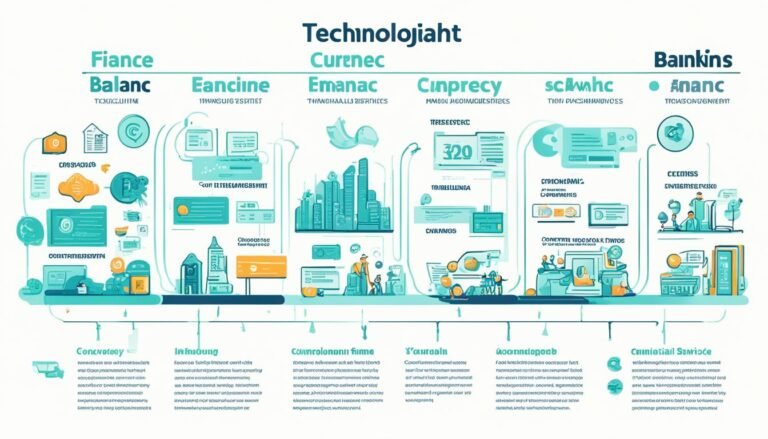The Evolution of Financial Markets: Past, Present, and Future
Financial markets have transformed from ancient barter systems to today's digital platforms. Stock exchanges emerged in the 17th century, enabling widespread trading and capital raising. Technology like blockchain and AI is revolutionizing market dynamics and security. Globalization has integrated markets, offering diverse investment opportunities. Cryptocurrencies challenge traditional currencies with blockchain technology enhancing transparency. Fintech tools like predictive analytics offer new insights and personalized strategies. Decentralized Finance (DeFi) and smart contracts are reshaping financial processes for inclusivity and security. The evolution of financial markets is a dynamic journey reflecting historical shifts and technological advancements, signaling exciting prospects for the future.
Key Takeaways
- Historical origins in ancient civilizations with barter systems and early forms of trade.
- Technological advancements like algorithmic trading and blockchain revolutionize market operations.
- Globalization transforms investment strategies, risk management, and market efficiency.
- Rise of cryptocurrencies challenges traditional currencies and introduces blockchain for secure transactions.
- Fintech innovations like predictive analytics and AI reshape decision-making and risk assessment in financial markets.
Ancient Financial Systems
The origins of financial systems can be traced back to ancient civilizations where rudimentary forms of trade, barter, and early monetary exchange laid the foundation for the development of more sophisticated financial mechanisms. In barter economies, goods and services were exchanged directly for other goods and services without a standardized medium of exchange. However, as societies grew more complex, the need for a more efficient means of trade became evident.
Ancient currencies emerged as a solution to the limitations of barter systems. These early forms of money varied widely, including commodities like shells, grain, and livestock, as well as standardized objects such as metal coins. These currencies facilitated trade by providing a common measure of value and a medium of exchange that was more portable and durable than goods themselves.
The development of ancient currencies marked a significant step towards the evolution of financial systems, paving the way for the establishment of more formalized methods of exchange and laying the groundwork for the sophisticated financial markets that exist today.
Rise of Stock Exchanges
Marking a pivotal shift in financial history, the emergence of stock exchanges revolutionized the landscape of investment and capital markets. Stock exchanges have a rich history dating back centuries, with one of the earliest examples being the Amsterdam Stock Exchange established in 1602. Over time, stock exchanges have evolved into sophisticated platforms where securities are bought and sold, enabling companies to raise capital from a wide investor base.
The rise of stock exchanges also led to significant advancements in market regulation. Regulatory bodies such as the Securities and Exchange Commission (SEC) in the United States and the Financial Conduct Authority (FCA) in the United Kingdom play an essential role in ensuring fair and transparent trading practices. Market regulation has evolved to prevent market manipulation, insider trading, and other unethical behaviors that could undermine the integrity of stock exchanges.
Digital Transformation in Trading
The digital transformation in trading has ushered in a new era characterized by the widespread adoption of algorithmic trading impacting market dynamics.
Moreover, the integration of blockchain technology in finance has revolutionized processes by enhancing transparency and security.
In addition, artificial intelligence trading strategies are playing an increasingly pivotal role in decision-making, offering sophisticated tools for market analysis and prediction.
Algorithmic Trading Impact
In the era of financial markets' digital transformation, the rise of algorithmic trading has revolutionized the landscape of trading practices. AI-driven trading algorithms have enabled market participants to execute trades with unprecedented speed and efficiency.
High frequency trading advantages include the ability to process vast amounts of data in real-time, identify patterns, and execute trades within fractions of a second. This has led to increased liquidity in markets, reduced trading costs, and enhanced price discovery mechanisms.
However, concerns regarding market stability and potential systemic risks have also emerged due to the rapid pace and complexity of algorithmic trading strategies.
As technology continues to advance, the impact of algorithmic trading on financial markets is likely to evolve, shaping the future of trading practices.
Blockchain in Finance
Amidst the ongoing digital transformation in trading practices, the integration of blockchain technology in finance is reshaping the landscape of financial markets.
Blockchain, known for its decentralized nature, is revolutionizing traditional financial processes by enabling peer-to-peer transactions without the need for intermediaries.
Decentralized finance (DeFi) platforms leverage blockchain to offer services such as lending, borrowing, and trading, directly to users without centralized control.
Smart contracts, a key feature of blockchain technology, automate the execution of agreements, enhancing transparency and reducing the risk of fraud.
As blockchain continues to gain traction in the financial sector, its potential to increase efficiency, security, and accessibility in trading activities is becoming more evident, paving the way for a new era of digital finance.
AI Trading Strategies
Continuously evolving trading practices are witnessing a profound shift towards the implementation of AI trading strategies, marking a significant milestone in the digital transformation of financial markets. Machine learning algorithms are being increasingly utilized to analyze vast amounts of data, enabling traders to make more informed decisions in real-time.
Quantitative analysis is playing a pivotal role in developing sophisticated trading models that can adapt to market dynamics swiftly. The integration of AI in trading strategies is enhancing automation, reducing human error, and improving overall efficiency in executing trades. This transformation is reshaping traditional trading landscapes, where speed and accuracy are paramount for success.
- Enhanced data analysis through machine learning algorithms
- Improved decision-making capabilities in real-time
- Automation of trading processes for enhanced efficiency
Impact of Globalization on Markets
The interconnected nature of global economies has greatly transformed the dynamics of financial markets, leading to a fundamental shift in investment strategies and risk management practices. Global market integration has created new opportunities for investors to diversify their portfolios by accessing a wider range of assets and markets. This integration has facilitated cross border investment opportunities, allowing investors to capitalize on the growth of emerging economies and participate in different market cycles.
Furthermore, globalization has increased market efficiency by enabling faster information dissemination and reducing barriers to trade. As a result, financial markets have become more interconnected and interdependent, with events in one part of the world quickly impacting markets globally. This has heightened the need for effective risk management strategies to navigate the increased volatility and interconnectedness of markets.
Emergence of Cryptocurrency
Globalization's impact on financial markets has paved the way for the emergence of cryptocurrency as a disruptive force reshaping the traditional notions of currency and investment. Decentralized currencies, powered by blockchain technology, have gained momentum in the financial world, challenging the centralized control of traditional currencies and financial systems. This shift has significant implications for various aspects of finance and investment.
- Decentralization: Cryptocurrencies operate on decentralized networks, eliminating the need for intermediaries such as banks or financial institutions in transactions.
- Blockchain Technology: The underlying technology behind cryptocurrencies, blockchain, guarantees transparency, security, and immutability of transactions, revolutionizing the way financial data is stored and shared.
- Disruptive Potential: Cryptocurrencies have the potential to disrupt traditional financial systems by offering alternatives for cross-border payments, smart contracts, and asset tokenization.
As the adoption of decentralized currencies continues to grow, understanding the implications of blockchain technology on financial markets becomes essential for investors, regulators, and financial institutions.
Future Innovations in Finance
Amidst the dynamic landscape of financial markets, the trajectory of future innovations in finance is poised to redefine traditional practices and propel the industry towards enhanced efficiency and adaptability. Fintech advancements are anticipated to play a pivotal role in reshaping the financial sector. The integration of predictive analytics into financial services is expected to revolutionize decision-making processes, risk assessment, and customer personalization. By leveraging big data and artificial intelligence, financial institutions can gain deeper insights into market trends, customer behavior, and investment opportunities, thereby enabling more informed strategies and tailored solutions.
Another significant development on the horizon is the rise of decentralized finance (DeFi) and smart contracts. DeFi, built on blockchain technology, aims to create a more inclusive and accessible financial system by eliminating intermediaries and providing direct peer-to-peer transactions. Smart contracts, self-executing agreements with the terms of the contract directly written into code, have the potential to automate various financial processes, such as payments, asset transfers, and compliance, thereby enhancing security and efficiency in financial transactions. As these innovations continue to evolve, they are expected to shape the future landscape of finance, driving progress towards a more interconnected, efficient, and secure financial ecosystem.
Conclusion
To sum up, the evolution of financial markets has been influenced by ancient systems, the rise of stock exchanges, digital transformation in trading, globalization, and the emergence of cryptocurrency.
Looking ahead, future innovations in finance will continue to revolutionize the way we invest and trade.
One interesting statistic to note is that the global cryptocurrency market cap reached $2 trillion in April 2021, highlighting the rapid growth and potential impact of digital currencies on the financial landscape.








